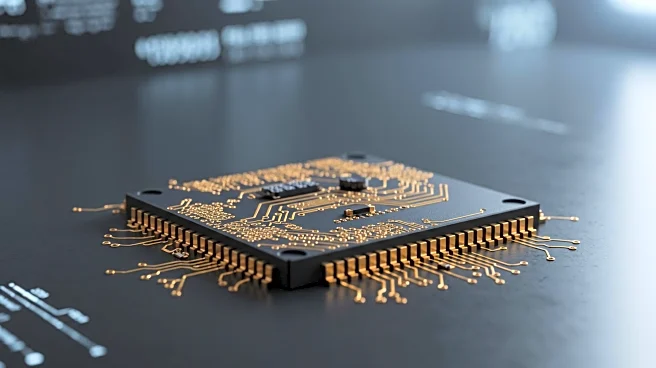What's Happening?
President Trump announced that Intel has agreed to a significant investment deal with the U.S. government, marking a rare instance of government financial involvement in a private company. The deal involves the U.S. purchasing a 9.9% stake in Intel for $8.9 billion, translating to 433.3 million shares at $20.47 per share. This investment is part of a broader strategy to bolster the domestic semiconductor industry, with funds sourced from the CHIPS Act and the Defense Department's Secure Enclave program. The agreement does not grant the government board representation or governance rights, but it does require the government to vote with Intel's board on shareholder matters, with limited exceptions.
Why It's Important?
This investment underscores the U.S. government's commitment to strengthening its semiconductor industry amid global supply chain challenges and competition from foreign manufacturers like Taiwan Semiconductor Manufacturing Company. By securing a stake in Intel, the government aims to ensure technological leadership and job creation within the U.S. semiconductor sector. The deal also reflects a strategic move to reduce reliance on foreign chip production, which has been a concern due to recent global chip shortages. Intel, facing declining market share and financial losses, stands to benefit from this infusion of capital, potentially aiding its turnaround efforts.
What's Next?
The deal is expected to provide Intel with the necessary capital to expand its manufacturing capabilities in the U.S., potentially leading to increased production and innovation in semiconductor technology. However, Intel's ability to regain its competitive edge remains uncertain, as it continues to face challenges from industry leaders like Nvidia and Advanced Micro Devices. The government's passive stake may also raise questions about the extent of its influence on Intel's strategic decisions. Analysts will be watching closely to see how Intel leverages this investment to address its operational and market challenges.
Beyond the Headlines
The U.S. government's intervention in Intel highlights a broader trend of increased government involvement in private sector operations, particularly in strategic industries like semiconductors. This move could set a precedent for future government investments in critical technology sectors, raising questions about the balance between public interest and corporate autonomy. Additionally, the deal may prompt discussions on the ethical and economic implications of government stakes in private companies, especially in terms of market competition and innovation.









